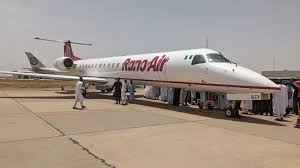The Nigeria Civil Aviation Authority (NCAA) has grounded a Rano Air aircraft with registration number 5N-BZY after it suffered an in-flight engine failure and cabin smoke incident during a Kano to Sokoto flight. The aircraft was forced to make an emergency return to the Aminu Kano International Airport after the pilot reported the issue to Air Traffic Control (ATC).
According to a statement issued by the NCAA on Monday, the incident occurred mid-flight when engine 1 of the aircraft developed a fault, prompting visible smoke in both the flight deck and the passenger cabin. Passengers and crew were said to have worn oxygen masks while safety protocols were quickly initiated on the ground to ensure a safe landing. Upon landing, the smoke cleared and there were no injuries reported.
The Directorate of Airworthiness, led by Mr Victor Foyea, confirmed that the aircraft would remain grounded while a thorough investigation is carried out to determine the exact cause of the incident. He said the regulatory authority is prioritising passenger safety and wants to ensure that all operational protocols are strictly followed.
The flight, which had already departed Kano, was scheduled to continue from Sokoto with another set of passengers, but that leg was cancelled immediately following the emergency. Engineers from the airline were seen at the airport preparing to carry out necessary maintenance checks on the grounded aircraft.
“The Rano aircraft 5N-BZY experienced a failure on its engine 1. Smoke was noticed in the cabin and flight deck. Oxygen masks were donned. The appropriate safety protocols were initiated on the ground for landing. Smoke dissipated. The pilot safely landed the aircraft without incident,” the NCAA’s statement said.
Efforts by journalists to reach the Managing Director of Rano Air, Mr Lawan Bakinzowo, for comments were unsuccessful, as calls and text messages were not responded to as of press time.
Aviation industry stakeholders have commended the quick intervention by the NCAA, describing it as a responsible and necessary move to safeguard passengers and reassure the public about air travel safety in Nigeria.
Captain Muhammad Badamosi, an experienced airline pilot, told reporters that such mechanical issues, though unfortunate, are not uncommon in aviation. He praised the NCAA’s decision to ground the aircraft pending investigations, calling it “the best course of action” under the circumstances. “Grounding the entire airline would not be right, but the aircraft in question must be examined thoroughly,” he added.
Similarly, retired aircraft engineer Air Vice Marshal Moses Onilede (rtd) commended the pilot for quickly making an air return rather than continuing the flight with an impaired engine. He stated that even though aircraft can technically fly with one engine, taking any risk in aviation is not advisable. “We should commend the pilot for immediately deciding to make an air return. That is the best thing to do. Aviation is built on safety first,” Onilede said.
He also emphasised the importance of releasing the full report of the incident after investigations to ensure transparency and prevent future occurrences. According to him, only after proper assessment by qualified engineers can the aircraft return to service.
The NCAA noted that safety concerns, no matter how minor, can lead to the cancellation or delay of flights in Nigeria, adding that the regulatory framework ensures strict compliance in line with global standards. The authority reminded passengers and operators that even in advanced countries, similar or worse air incidents occur, but what makes the difference is how they are handled.
The incident adds to a growing list of safety interventions by the NCAA aimed at improving Nigeria’s aviation safety profile. Over the past year, several airlines have been directed to suspend certain operations or ground aircraft after technical inspections.
The Rano Air incident is expected to reignite conversations around airline safety, maintenance culture, and regulatory compliance in the country’s aviation sector.
